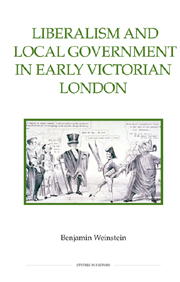Book contents
- Frontmatter
- Contents
- Acknowledgements
- Abbreviations
- Introduction
- 1 Liberal attachments to the unreformed metropolis
- 2 The ‘radicalisation’ of metropolitan political culture, 1832–1841
- 3 The polarisation of metropolitan political culture, 1842–1855
- 4 Redefining the state, I: Rates and taxes, 1834–1853
- 5 Redefining the state, II: The London government problem
- 6 Marylebone in 1854: from conflict to compromise
- Conclusion
- Bibliography
- Index
3 - The polarisation of metropolitan political culture, 1842–1855
Published online by Cambridge University Press: 12 September 2012
- Frontmatter
- Contents
- Acknowledgements
- Abbreviations
- Introduction
- 1 Liberal attachments to the unreformed metropolis
- 2 The ‘radicalisation’ of metropolitan political culture, 1832–1841
- 3 The polarisation of metropolitan political culture, 1842–1855
- 4 Redefining the state, I: Rates and taxes, 1834–1853
- 5 Redefining the state, II: The London government problem
- 6 Marylebone in 1854: from conflict to compromise
- Conclusion
- Bibliography
- Index
Summary
At the fall of Melbourne's second government, vestry reformers still wielded significant electoral influence in the metropolitan boroughs. In Marylebone, the Barlow Street committee, although smarting from the 1838 by-election return of the Tory Lord Teignmouth, was still powerful enough in 1841 to engineer the return of its preferred candidate, Admiral Sir Charles Napier. Like Duncombe, Tennyson and so many of his fellow metropolitan MPs, Napier cut an aristocratic and romantic figure. In addition to a reputation for military heroism (at sea rather than on land – Napier was sometimes mistaken for his namesake, the conqueror of the Sind, whose own military ‘heroism’ is commemorated with a bronze statue in Trafalgar Square), Napier possessed a clutch of honorary titles. He was, for instance, a Knight Commander of the Bath, a Knight of the Tower and Sword in Portugal, a Knight of St George in Russia, a Knight of Maria Teresa in Austria, and a Knight of the Red Eagle in Prussia. Unlike Tennyson and Duncombe, however, Napier was far from an out-and-out political radical. Although he vigorously advocated the protection and extension of vestry rights and powers, Napier could not, for instance, bring himself to endorse either universal suffrage or annual parliaments. Under the protection and guidance of the Barlow Street committee, he instead promoted a programme of government retrenchment through tax and trade reform while offering lukewarm support for moderate political reform. As Napier's example suggests, whereas retrenchment and ‘local self-government’ had once been understood by the vestry reformers as a means to the larger end of parliamentary reform, by 1841 ‘local self-government’ was fast becoming a great end in itself.
- Type
- Chapter
- Information
- Publisher: Boydell & BrewerPrint publication year: 2011

